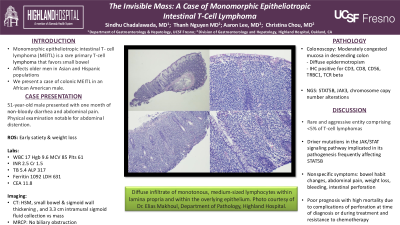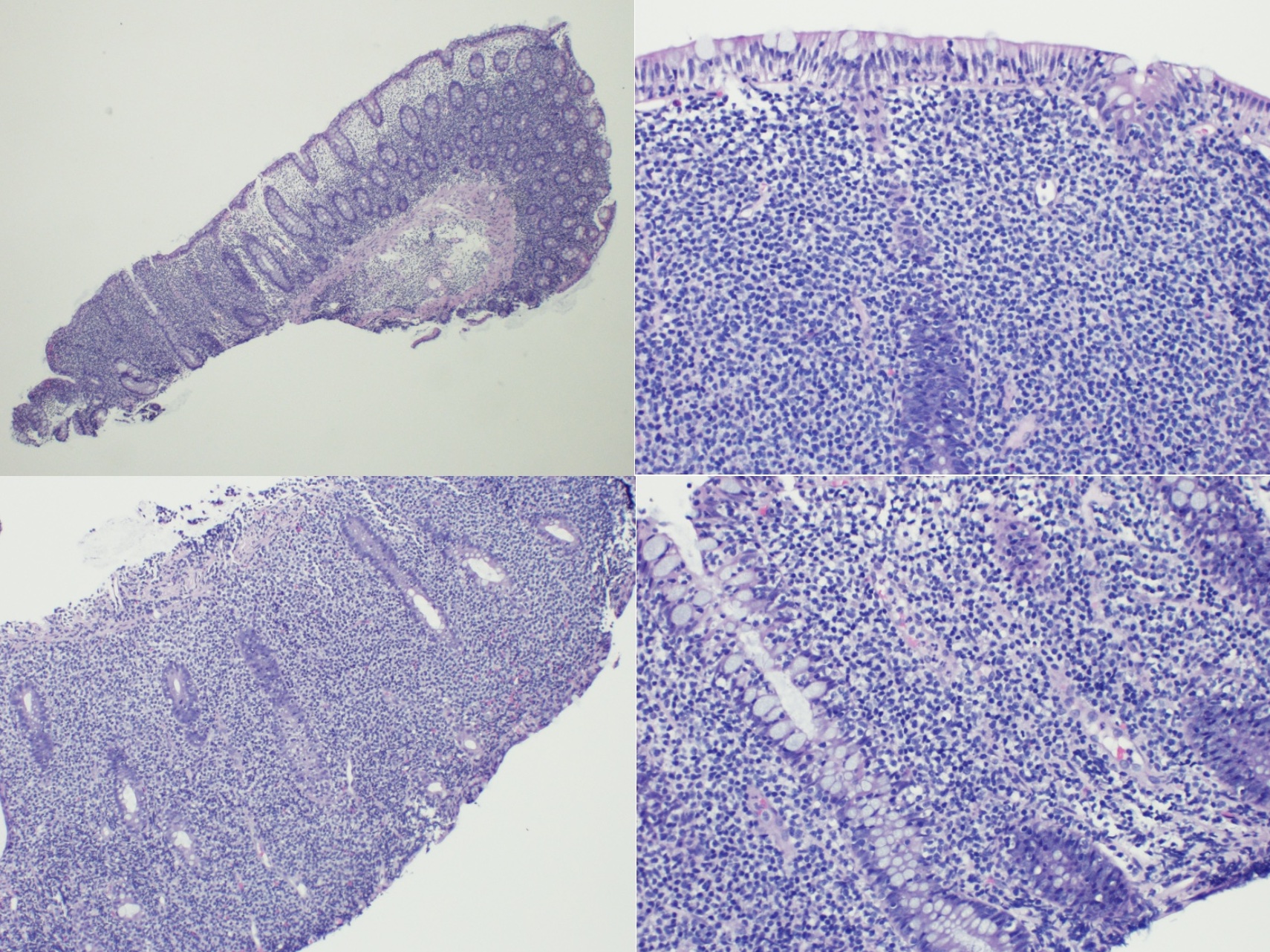Tuesday Poster Session
Category: Colon
P3787 - The Invisible Mass: A Case of Monomorphic Epitheliotropic Intestinal T-Cell Lymphoma
Tuesday, October 29, 2024
10:30 AM - 4:00 PM ET
Location: Exhibit Hall E

Has Audio
- SC
Sindhu Chadalawada, MD
Alameda Health System
Fresno, CA
Presenting Author(s)
Sindhu Chadalawada, MD, Thanh Ngoc. Nguyen, MD, Aaron Lee, MD, Christina Chou, MD
Alameda Health System, Oakland, CA
Introduction: Monomorphic epitheliotropic intestinal T-cell lymphoma (MEITL) is a rare primary T-cell lymphoma that favors small bowel and commonly affects older men in Asian and Hispanic populations. We present a case of colonic MEITL in an African American male.
Case Description/Methods: A 51-year-old male presented with one month of non-bloody diarrhea and abdominal pain. Review of systems was notable for early satiety and unintentional weight loss. Physical examination revealed abdominal distension. Initial workup showed leukocytosis (17), normocytic anemia (9.6 g/dL), thrombocytopenia (61), acute kidney injury (creatinine 1.5 mg/dL), cholestatic liver enzymes (direct bilirubin 5.4 mg/dL, ALP 317 U/L), coagulopathy (INR 2.5), elevated lactate dehydrogenase (631 U/L), and hyperferritinemia (1,092 ng/mL). Carcinoembryonic antigen was elevated at 11.8 ng/mL. CT demonstrated hepatosplenomegaly, small bowel and sigmoid colon wall thickening with 3.3 cm intramural sigmoid collection vs mass. Magnetic resonance cholangiopancreatography did not show biliary obstruction. Colonoscopy showed moderately congested mucosa in the descending colon, which was biopsied. Pathology demonstrated diffuse epidermotropism consistent with MEITL. Immunohistochemistry was positive for CD3, CD8, CD56, TRBC1, and TCR beta. Stains for CD4 and CD5 highlighted scattered reactive T cells. Next generation sequencing (NGS) showed mutations in STAT5B, JAK3, and chromosome copy number alterations. The patient was started on methylprednisolone and Romidepsin, and histone deacetylase inhibitor. Unfortunately, he continued to decline with progressive acute liver and renal failure. He was transitioned to comfort care and passed shortly thereafter.
Discussion: MEITL is a rare and aggressive entity comprising < 5% of T-cell lymphomas. They are distinguished from enteropathy associated T-cell lymphoma (EATL), often associated with celiac disease in Western populations, along with expression of CD8 and CD56 and presence of monomorphic neoplastic cells. Driver mutations in the JAK/STAT signaling pathway have been implicated in its pathogenesis frequently affecting STAT5B. Diagnosing MEITL is often delayed due to its nonspecific symptoms such as bowel habit changes, abdominal pain, weight loss, bleeding, intestinal perforation, or misinterpreted as enteritis or inflammatory bowel disease on imaging. Prognosis is poor with high mortality, due to complications of perforation at time of diagnosis or during treatment and resistance to chemotherapy.

Disclosures:
Sindhu Chadalawada, MD, Thanh Ngoc. Nguyen, MD, Aaron Lee, MD, Christina Chou, MD. P3787 - The Invisible Mass: A Case of Monomorphic Epitheliotropic Intestinal T-Cell Lymphoma, ACG 2024 Annual Scientific Meeting Abstracts. Philadelphia, PA: American College of Gastroenterology.
Alameda Health System, Oakland, CA
Introduction: Monomorphic epitheliotropic intestinal T-cell lymphoma (MEITL) is a rare primary T-cell lymphoma that favors small bowel and commonly affects older men in Asian and Hispanic populations. We present a case of colonic MEITL in an African American male.
Case Description/Methods: A 51-year-old male presented with one month of non-bloody diarrhea and abdominal pain. Review of systems was notable for early satiety and unintentional weight loss. Physical examination revealed abdominal distension. Initial workup showed leukocytosis (17), normocytic anemia (9.6 g/dL), thrombocytopenia (61), acute kidney injury (creatinine 1.5 mg/dL), cholestatic liver enzymes (direct bilirubin 5.4 mg/dL, ALP 317 U/L), coagulopathy (INR 2.5), elevated lactate dehydrogenase (631 U/L), and hyperferritinemia (1,092 ng/mL). Carcinoembryonic antigen was elevated at 11.8 ng/mL. CT demonstrated hepatosplenomegaly, small bowel and sigmoid colon wall thickening with 3.3 cm intramural sigmoid collection vs mass. Magnetic resonance cholangiopancreatography did not show biliary obstruction. Colonoscopy showed moderately congested mucosa in the descending colon, which was biopsied. Pathology demonstrated diffuse epidermotropism consistent with MEITL. Immunohistochemistry was positive for CD3, CD8, CD56, TRBC1, and TCR beta. Stains for CD4 and CD5 highlighted scattered reactive T cells. Next generation sequencing (NGS) showed mutations in STAT5B, JAK3, and chromosome copy number alterations. The patient was started on methylprednisolone and Romidepsin, and histone deacetylase inhibitor. Unfortunately, he continued to decline with progressive acute liver and renal failure. He was transitioned to comfort care and passed shortly thereafter.
Discussion: MEITL is a rare and aggressive entity comprising < 5% of T-cell lymphomas. They are distinguished from enteropathy associated T-cell lymphoma (EATL), often associated with celiac disease in Western populations, along with expression of CD8 and CD56 and presence of monomorphic neoplastic cells. Driver mutations in the JAK/STAT signaling pathway have been implicated in its pathogenesis frequently affecting STAT5B. Diagnosing MEITL is often delayed due to its nonspecific symptoms such as bowel habit changes, abdominal pain, weight loss, bleeding, intestinal perforation, or misinterpreted as enteritis or inflammatory bowel disease on imaging. Prognosis is poor with high mortality, due to complications of perforation at time of diagnosis or during treatment and resistance to chemotherapy.

Figure: Diffuse infiltrate of monotonous, medium-sized lymphocytes within lamina propria and within the overlying epithelium. Photo courtesy of Dr. Elias Makhoul, Department of Pathology, Highland Hospital.
Disclosures:
Sindhu Chadalawada indicated no relevant financial relationships.
Thanh Nguyen indicated no relevant financial relationships.
Aaron Lee indicated no relevant financial relationships.
Christina Chou indicated no relevant financial relationships.
Sindhu Chadalawada, MD, Thanh Ngoc. Nguyen, MD, Aaron Lee, MD, Christina Chou, MD. P3787 - The Invisible Mass: A Case of Monomorphic Epitheliotropic Intestinal T-Cell Lymphoma, ACG 2024 Annual Scientific Meeting Abstracts. Philadelphia, PA: American College of Gastroenterology.
